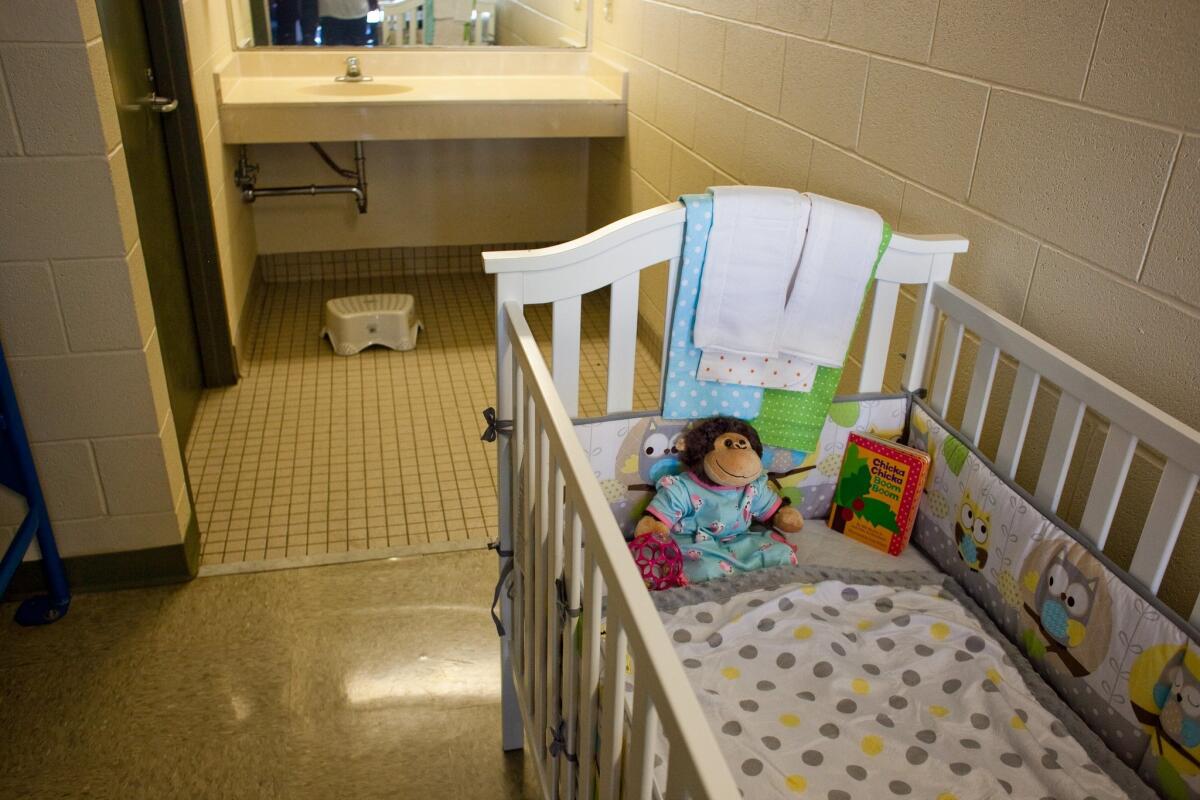Detention conditions ‘similar, if not worse’ than migrants’ home countries, report says

The Karnes County Residential Center in Karnes City, Texas. The facility was one of two sites visited by the U.S. Civil Rights Commission in its investigation of immigrant detention center conditions.
- Share via
The U.S. Civil Rights Commission recommended Thursday that the Obama administration release immigrant families who have illegally crossed into the United States mainly from Central America and are being held in detention centers where there have been complaints of poor food, inadequate medical care and allegations of sexual abuse.
In its report, the independent commission also found that the immigrants were often denied such rights as due process. It recommended that Congress stop funding the nation’s family detention centers, which have become a sore point among immigration rights activists.
“While these immigrants migrate to the United States to escape harsh living conditions, once they cross the U.S. border without authorization and proper documentation, the federal government apprehends and detains these individuals in conditions that are similar, if not worse, than the conditions they faced from their home countries,” according to the report.
In compiling its findings, the commission held hearings and in May visited two Texas sites -- a detention center in Karnes City and a processing center in Port Isabel. The report was backed by five of the commission members and opposed by two who questioned the methodology and findings. One member didn’t vote.
The Obama administration is detaining an estimated 1,400 parents and children in Karnes City and Dilley in Texas, and in Berks County, Penn.
NEWSLETTER: Get the day’s top headlines from Times Editor Davan Maharaj >>
The detention of families came as a response to a sharp increase in the number of people — mostly from Central America — crossing into the U.S. Southwest in 2014. Last fiscal year, more than 68,000 people were caught crossing the U.S.-Mexico border.
Activists have alleged that the centers do not have proper food and that detainees do not receive adequate medical care. The lack of lawyers has also been a frequent complaint.
The civil rights commission, created in 1957 to explore due process and other issues, found that the 500-bed family detention center in Karnes and a similar, 2,400-bed facility in Dilley violate a landmark court settlement governing the treatment of immigrant children.
“No children, with or without an accompanying adult, should be forced to live in these facilities,” the commission said in the letter to President Obama accompanying the report. “The detrimental effect on these children far outweighs the government’s wish to deter others from flee life-threatening conditions in their home countries.”
In August, a federal judge ordered the prompt release of children held at family detention facilities unless they are a significant flight risk or a danger to themselves and others. Judge Dolly Gee in Los Angeles gave federal officials until Oct. 23 to comply with her order, which is pending in the courts.
In a statement released Friday, DHS Secretary Jeh C. Johnson did not directly mention the Civil Rights Commission report but said his agency remains committed to reforming family residential center policies.
“Over the past several months, we have implemented significant reforms to how we operate our family residential centers,” he stated, including establishing an advisory committee “with experts in mental health, family and youth services, and other areas to advise on our policies going forward. With these reforms, the detention of families is becoming short-term in most cases.”
Johnson also said the agency disagrees with the legal reasoning in the Los Angeles case and has filed a notice of appeal.
“But we remain committed to reforming our family residential center policies, as we have been doing for the past several months,” he said.
See the most-read stories this hour >>
The two commissioners who opposed the report said the agency has been unable to independently verify the reports of mistreatment. Some of the allegations included that food with maggots was served, an AIDS patient was ignored and died of her illness, transgender individuals are housed in facilities based on their birth gender and some children were sexually abused.
“The chairman’s statement suggests that the treatment of detainees is comparable to torture,” wrote Commissioner Gail Heriot, a law professor at the University of San Diego.
“Lots of ugly rumors are uncritically repeated — like the presence of maggots in the food served by detention center kitchens, sexual assaults, deaths, etc. Some of the rumors were investigated by DHS and others and found to be untrue or very unlikely, but the commission’s report doesn’t bother to mention those investigations. In no case did the commission undertake an investigation to determine the truth or falsity of a rumor it reported,” she wrote.
In her rebuttal, included in the report, Heriot said: “It is said that where there is smoke, there is fire. But sometimes where there is smoke, there is only a smoke-making machine, busily stoked by publicists working for activist organizations.”
She was joined by another commissioner who criticized the report.
“Like mold on food left in the refrigerator for too long, the report has spread into an attack on the enforcement of the country’s immigration laws, and perhaps on their very existence. Much of the report is at least intellectually dishonest, other parts simply dishonest. This report is outside the commission’s jurisdiction and therefore most of this report is illegitimate,” said Commissioner Peter Kirsanow.
Follow @latimesmuskal for national news.
ALSO:
Tsunami surge could help experts predict future ocean events
How student Ahmed Mohamed went from suspected bomb maker to overnight celebrity
A high-speed rail from L.A. to Las Vegas? China says it’s partnering with U.S. to build
More to Read
Sign up for Essential California
The most important California stories and recommendations in your inbox every morning.
You may occasionally receive promotional content from the Los Angeles Times.











